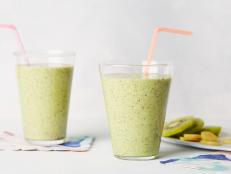Is Prediabetes Reversible?
Yes, and here’s how you can eat to bring your blood sugar levels back to normal.

Dulin/Getty Images
Prediabetes, a condition where blood sugar levels are higher than normal but not yet high enough to be classified as type 2 diabetes, is becoming increasingly prevalent, with nearly 30 percent of U.S. adults having prediabetes. Many people are unaware that they have the condition until it develops into type 2 diabetes, and more serious health complications arise.
Prediabetes is typically diagnosed when blood work shows elevated levels of fasting blood glucose (between 100 to 125 mg/dL) or elevated HbA1c levels (between 5.7 percent to 6.4 percent). Levels that exceed this would classify as diabetes, and at this stage, the body’s ability to produce or respond to insulin, the hormone responsible for regulating blood sugar, is significantly impaired, leading to persistent hyperglycemia and increased risk of complications.
However, the truth is that prediabetes is not a life sentence. In fact, it can be reversed through lifestyle changes centered around things like balanced nutrition and physical activity. As a registered dietitian, I help people develop tools that will support them in making informed and sustainable lifestyle changes.
It may be helpful to see prediabetes as our body’s way of nudging us to pay closer attention to our health. It’s a nudge that should not be ignored. By implementing certain interventions, we can effectively halt its progression and even restore our blood sugar levels back to a healthy range.

elena_hramowa/Getty Images
What To Eat To Reverse Prediabetes
When it comes to reversing prediabetes, a balanced and nutrient-dense diet takes center stage. Here are some key dietary strategies to support blood sugar regulation and promote overall well-being:
Increase Fiber Intake: Plan your plate around plant-based foods like vegetables, whole grains, legumes, nuts and seeds. And yes, you can incorporate fruits as well! Beyond providing fiber, these nutrient-packed foods have vitamins, minerals, and antioxidants, all of which play a crucial role in stabilizing blood sugar levels and reducing insulin resistance.
Always Include Protein: Adding protein to meals and snacks helps regulate blood sugar levels and promote satiety. Think poultry, fish, eggs, tofu, tempeh, beans and lentils, and distribute protein intake throughout the day with meals and snacks to support healthy ranges for blood glucose.
Don’t Restrict Carbs or Fat: Carbohydrates are an essential source of energy, and there’s absolutely no need to restrict them if you have prediabetes (or diabetes for that matter). Rather than cutting out carbs, focus on selecting high-fiber, nutrient-dense options that support stable blood sugar levels and overall health. Carbs like brown rice, quinoa, sweet potatoes, oats and legumes provide fiber and essential nutrients that may help with a gradual and sustained release of energy. However this doesn’t mean you can’t enjoy refined carbohydrates like white rice, breads and pastas. If you prefer these foods, pair with protein and plenty of fiber-rich vegetables for optimal balance.
Along the same lines, incorporating heart-healthy fats such as avocados, nuts, seeds, olive oil and fatty fish into your diet helps to promote feelings of fullness and support blood sugar management. They also help us absorb fat soluble vitamins A, D, E and K.

Luis Alvarez/Getty Images
Lifestyle Factors Beyond the Plate
While nutrition plays an important role in reversing prediabetes, it’s essential to address other lifestyle factors that may also be impacting metabolic health:
Movement: Consistent physical activity improves insulin sensitivity, lowers blood sugar levels and supports overall health. Find activities you enjoy and aim for at least 150 minutes of moderate-intensity exercise per week, such as dancing, yoga, cycling or swimming. Also try to incorporate resistance exercises like weights and resistance bands, which help to build muscle mass and improve insulin sensitivity. Resistance exercise also promotes bone health and enhances mobility and functional strength. Make sure to alternate between different muscle groups to ensure a comprehensive strength development routine.
Prioritize Stress Management: Chronic stress can significantly disrupt blood sugar regulation and worsen insulin resistance. Stress hormones like cortisol can elevate blood sugar levels, while also contributing to insulin resistance over time. The mental toll of managing a chronic condition can also contribute to stress, potentially leading to anxiety, depression or burnout. Prioritizing stress management strategies such as mindfulness, relaxation techniques and seeking support from healthcare professionals is essential for mitigating the impact of stress on diabetes management and promoting overall well-being.
Get Quality Sleep: Adequate sleep is essential for metabolic health and blood sugar regulation. Aim for seven to nine hours of quality sleep per night, and establish a consistent sleep routine to support your body’s natural circadian rhythm.
By being more intentional with nutrition, movement, adequate sleep and stress management, people with prediabetes can absolutely slow down and possibly reverse the progression of prediabetes into type 2 diabetes. Prediabetes can be seen as an alert to prioritize self-care, make mindful choices and cultivate habits that support long-term health.
Related Content:


































